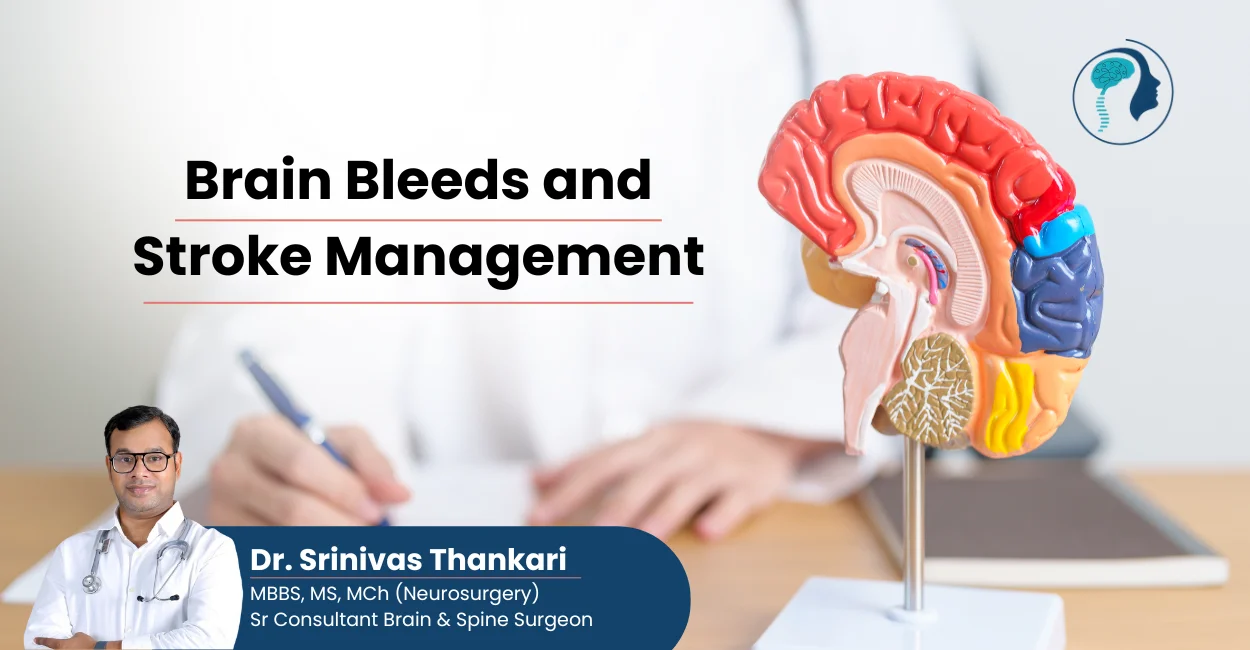
Brain Bleeds and Stroke Management | Expert Brain Surgeon in Hyderabad
Brain bleeds (intracranial hemorrhage) and strokes are life-threatening conditions requiring immediate medical intervention. Brain bleeds occur due to ruptured blood vessels in or around the brain, while strokes result from either blocked or ruptured arteries, cutting off blood supply to the brain. Timely diagnosis and advanced treatment are essential to minimize brain damage and improve outcomes.
Types of Brain Bleeds and Stroke
-
Ischemic Stroke: Occurs when a clot or plaque blocks blood flow to the brain.
-
Hemorrhagic Stroke: Caused by a ruptured blood vessel leading to brain bleeding.
-
Subarachnoid Hemorrhage: Bleeding in the space between the brain and its surrounding membrane.
-
Intracerebral Hemorrhage: Bleeding directly into the brain tissue.
-
Transient Ischemic Attack (TIA):A temporary blockage, also called a "mini-stroke."
Symptoms of Brain Bleeds and Stroke
-
Sudden weakness or numbness on one side of the body
-
Severe headache with no known cause
-
Vision problems or double vision
-
Difficulty speaking or understanding speech
-
Loss of balance or coordination
-
Confusion, dizziness, or fainting
-
Seizures or loss of consciousness (in brain bleeds)
Causes and Risk Factors
-
High Blood Pressure: A leading cause of hemorrhagic strokes.
-
Aneurysms: Weak spots in arteries prone to rupture.
-
Head Injury: Trauma causing intracranial bleeding.
-
Blood Clots: Can obstruct arteries and trigger ischemic strokes.
-
Lifestyle Factors:Smoking, obesity, and a sedentary lifestyle.
-
Chronic Conditions: Diabetes, high cholesterol, and heart disease.
Advanced Diagnostics for Stroke and Brain Bleeds
Dr. Srinivas Thankari utilizes cutting-edge technology to accurately diagnose brain bleeds and strokes:
-
MRI and CT Scans: Detects blockages, hemorrhages, or brain swelling.
-
Cerebral Angiography: Visualizes blood vessels to locate abnormalities.
-
Doppler Ultrasound: Measures blood flow in the brain’s arteries.
-
Blood Tests: Checks for clotting disorders or risk factors like high cholesterol.
Treatment Options for Brain Bleeds and Stroke Management
As a leading brain surgeon in Uppal, Hyderabad, Dr. Srinivas offers specialized care based on the type of stroke or brain bleed:
Emergency Stroke Treatment
-
Clot-Dissolving Medications (tPA):For ischemic strokes, administered within the first few hours.
-
Mechanical Thrombectomy:A minimally invasive procedure to remove clots from arteries.
-
Hemorrhagic Stroke and Brain Bleed Treatment
-
Craniotomy:Surgery to relieve pressure and remove clots from the brain.
-
Aneurysm Clipping or Coiling: Prevents further bleeding from aneurysms.
-
Blood Pressure Management: Critical for preventing further damage.
Post-Stroke Rehabilitation and RecoveryDr. Srinivas provides personalized rehabilitation plans to enhance recovery:
-
Physical Therapy:Restores strength, mobility, and coordination.
-
Speech Therapy:Helps patients regain speech and language skills.
-
Occupational Therapy:Assists in adapting to daily activities post-stroke.
-
Psychological Support: Manages emotional challenges like anxiety and depression.
Preventive Stroke Care and Long-Term Management
-
Hypertension Management: Controlling blood pressure to prevent future strokes.
-
Cholesterol Management: Reduces the risk of arterial blockages.
-
Lifestyle Changes:Includes smoking cessation, exercise, and healthy eating habits.
-
Follow-Up Care:Regular check-ups to monitor recovery and prevent recurrence.
Why Choose Dr. Srinivas Thankari for Stroke and Brain Bleed Management?
With extensive expertise in neurosurgery and stroke management, Dr. Srinivas Thankari is a trusted brain surgeon in Uppal, Hyderabad. His patient-centered approach ensures:
-
Accurate diagnosis with advanced imaging techniques
-
Tailored treatment plans for optimal recovery
-
Comprehensive post-stroke care to enhance quality of life
If you or a loved one is experiencing symptoms of a stroke or brain bleed, seek immediate care. Consult Dr. Srinivas Thankari in Hyderabad to receive expert treatment and personalized care for fast recovery and better outcomes.

